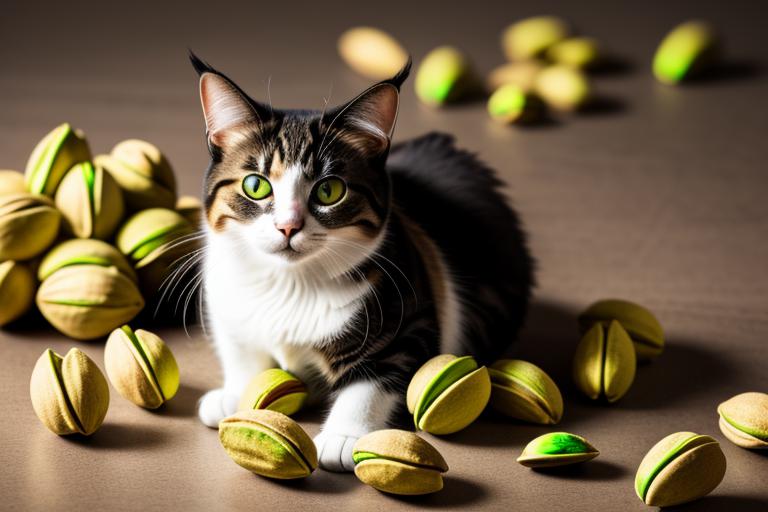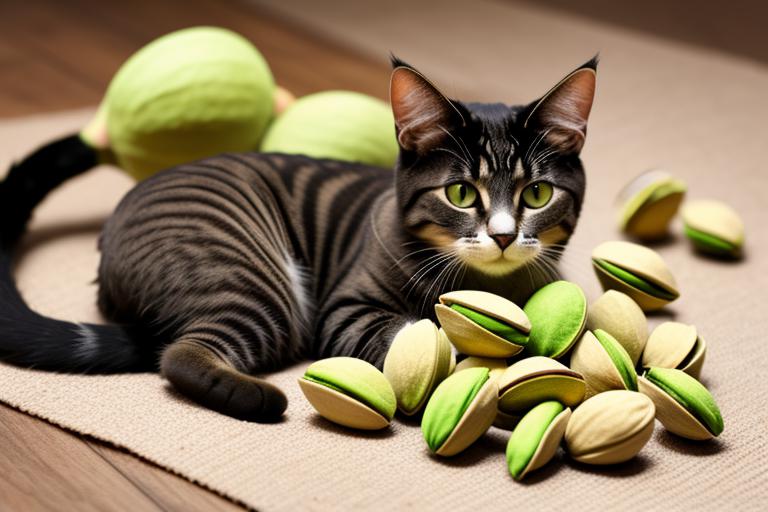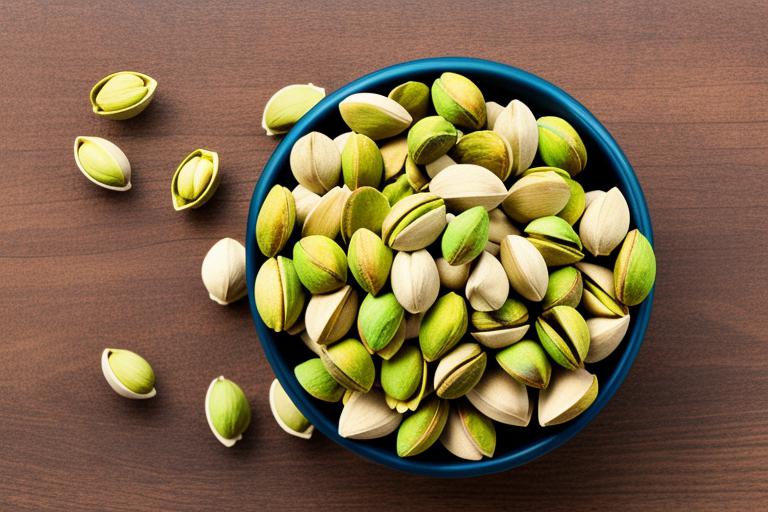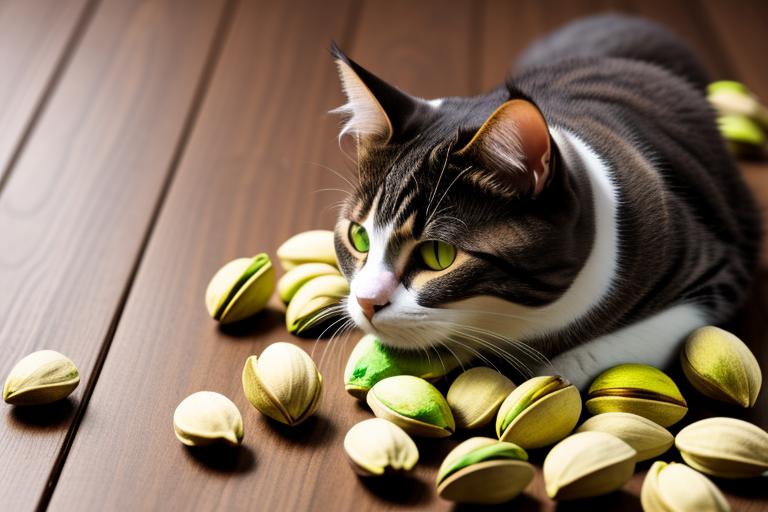As a cat owner, you want to ensure that your feline friend is getting the best nutrition possible. With the growing popularity of pistachios as a healthy snack for humans, you might be wondering if these nuts are safe for your cat to munch on. In this comprehensive article, we will explore the potential benefits and risks of feeding pistachios to cats. We’ll delve into the nutritional value of pistachios for felines, the possible gastrointestinal and allergic reactions they may cause, and the risk of pancreatitis. We’ll discuss the recommended serving size for cats and provide alternative treats that are safe for your pet.
We’ll cover what to do if your cat accidentally consumes pistachios. By the end, you will have a clear understanding of whether cats can eat pistachios in moderation. Let’s dive into this important topic and ensure the well-being of our furry companions.
Are Pistachios Safe for Cats?
It’s essential to understand the potential impact of pistachios on the health of cats, especially considering the various dietary choices and health complications that can arise from inappropriate consumption.
Pistachios are not inherently toxic to cats, but they can pose risks due to specific ingredients often found in flavored varieties. Ingredients like salt, onion, and garlic commonly used in pistachio flavorings are harmful to cats. High salt content can lead to sodium ion poisoning, while onion and garlic can cause damage to cats’ red blood cells, leading to anemia. These risks emphasize the importance of ensuring that any pistachios offered to cats are unseasoned and unsalted. In case of accidental ingestion, it’s crucial to monitor for symptoms of poisoning and seek immediate veterinary care if necessary. Pet owners may want to consider having pet insurance to address unforeseen medical expenses.
What Are the Nutritional Benefits of Pistachios for Cats?

Understanding the nutritional aspects of pistachios for cats is crucial for evaluating their potential benefits and drawbacks in the feline diet.
Pistachios contain a variety of essential nutrients including protein, fiber, healthy fats, and various vitamins and minerals. In terms of feline dietary requirements, a feline nutritionist plays a vital role in assessing the impact of these components on a cat’s health. For instance, the protein content in pistachios can contribute to a feline’s muscle development and overall well-being.
The high-fat content in pistachios could lead to digestive issues or weight problems in cats if consumed in excessive amounts.
What Are the Potential Risks of Feeding Pistachios to Cats?
Feeding pistachios to cats entails potential risks that stem from specific ingredients and health implications, necessitating a comprehensive understanding of the associated dangers.
One of the primary risks associated with feeding pistachios to cats is the presence of harmful ingredients such as salt, onion, and garlic. These ingredients, when ingested by cats, can lead to a range of health issues, including pancreatitis, hemolytic anemia, and gastrointestinal problems. Pistachios are susceptible to aflatoxin contamination, which can be extremely toxic to cats, potentially causing liver damage and other serious health complications. Therefore, it is crucial for cat owners to exercise caution and avoid feeding their feline companions with pistachios or any food that may pose similar risks.”
Can Pistachios Cause Gastrointestinal Upset in Cats?
The potential for pistachios to cause gastrointestinal upset in cats is a significant concern, especially in the context of their dietary tolerance and susceptibility to health complications.
Cats are obligate carnivores, and their digestive systems are not equipped to handle certain foods that humans consume regularly.
Consumption of pistachios by cats can lead to symptoms such as vomiting, diarrhea, and abdominal pain due to the high fat content and seasoning. The salt content in pistachios can be particularly harmful to cats, as excessive salt intake can lead to dehydration and electrolyte imbalances in their bodies. Therefore, it is crucial for cat owners to be vigilant and prevent access to pistachios, while monitoring their pets closely for any signs of digestive distress. Seeking prompt veterinary care is imperative if any gastrointestinal issues arise, as early intervention can prevent further complications.
Can Pistachios Cause Allergic Reactions in Cats?

The potential for pistachios to trigger allergic reactions in cats raises concerns about their safety and the management of associated health complications.
While pistachios are not a commonly known allergen for cats, it’s essential to recognize that allergic reactions in felines can have serious implications. Symptoms may include itching, skin rashes, vomiting, diarrhea, and difficulty breathing. Cats with a pistachio allergy may also exhibit behavioral changes like restlessness or lethargy.
If a cat displays any signs of an allergic reaction after consuming pistachios, prompt veterinary intervention is necessary. Delayed treatment can lead to severe health issues. It’s crucial for cat owners to avoid offering pistachios and other nuts as treats without professional advice, as sensitivities and allergies can vary widely among individual cats.
Can Pistachios Cause Pancreatitis in Cats?
The potential link between pistachios and pancreatitis in cats underscores the need for understanding the risks and implications associated with their consumption.
While pistachios are a popular and delicious snack for humans, they can pose a significant risk to cats due to their high-fat content and potential to trigger pancreatitis.
Feline pancreatitis is a serious condition that can lead to inflammation of the pancreas, causing symptoms such as loss of appetite, vomiting, abdominal pain, and lethargy. It’s essential for cat owners to be mindful of what their pets have access to and to avoid feeding them foods that may be harmful.
If a cat exhibits any signs of pancreatitis, it’s crucial to seek prompt veterinary care to assess and manage the condition effectively.
How Many Pistachios Can a Cat Safely Eat?

Determining the safe quantity of pistachios for cats to consume requires a balanced consideration of serving sizes and their dietary implications.
Cats are obligate carnivores, meaning their diet should primarily consist of animal-based protein. Although pistachios may seem like a healthy snack for humans, they’re not suitable for cats due to their high fat content and potential risk of causing gastrointestinal upset. Even a small amount of pistachios can lead to health issues in cats. It’s crucial to prioritize a balanced feline diet comprising high-quality cat food, and avoid sharing human food. Always consult with a veterinarian before introducing any new foods into your cat’s diet.
What Is the Recommended Serving Size for Cats?
Identifying the recommended serving size for pistachios in a cat’s diet involves considering their nutritional requirements and the potential implications of excess consumption.
When determining the appropriate serving size of pistachios for cats, it’s essential to take into account their dietary needs. Cats are obligate carnivores, meaning their diet primarily consists of animal-based proteins. While pistachios contain certain nutrients, they are not a natural part of a cat’s diet. Excessive consumption of pistachios can lead to various health issues in cats, especially due to their high fat content. Overindulgence in fatty foods can result in digestive disturbances, obesity, and pancreatitis. Therefore, moderation in offering pistachios to cats is crucial to prevent such health risks.
How Often Can Cats Eat Pistachios?
Establishing the frequency of pistachio consumption by cats requires an understanding of their dietary needs and the potential health implications associated with regular intake.
Cats are obligate carnivores, and their diet should primarily consist of high-quality protein sources. While pistachios can provide some nutritional benefits such as healthy fats and protein, they should be offered infrequently and in small amounts. Excessive consumption of pistachios can lead to digestive issues, obesity, or potential allergic reactions in cats. It’s essential to prioritize a well-balanced diet for your feline companion, focusing on specially formulated cat food that meets their specific dietary requirements.
What Are Some Alternatives to Feeding Pistachios to Cats?
Exploring alternative options for treating cats involves identifying suitable substitutes for pistachios that align with their dietary preferences and well-being.
Cats have specific dietary needs, so it is crucial to select treats that provide the necessary nutrition without risking their health. A popular choice is freeze-dried meat, such as chicken or fish, which caters to their carnivorous nature. Another option could be catnip-infused treats, which offer a flavor cats adore without the risks associated with certain human foods. Frozen peas or carrots might also appeal to cats and provide a crunchy texture, satisfying their natural urge to chew. It’s essential to consider both the nutritional value and safety when introducing new treats, ensuring the chosen options complement the cat’s overall diet and health.
Are There Other Nuts That Are Safe for Cats to Eat?
Exploring the safety of other nuts for cats involves assessing their suitability as dietary components, especially in comparison to the potential risks associated with pistachios.
While pistachios can be harmful to cats due to the presence of aflatoxins and higher fat content, almonds are generally considered safe and are often found in cat treats. They should be fed in moderation due to their high fat content.
Cashews are also considered safe for cats in small quantities, as they provide essential nutrients like protein and healthy fats. On the other hand, it’s crucial to note that macadamia nuts are toxic to cats and should be strictly avoided.
When considering introducing alternative nuts to a cat’s diet, it’s important to consult a veterinarian to ensure the nuts are suitable for the individual cat’s health and nutritional needs. Monitoring for any allergic reactions or digestive issues after introducing nuts into a cat’s diet is essential for their overall well-being.
What Are Some Cat-Safe Treats That Are Similar to Pistachios?
Identifying cat-safe treats that resemble the characteristics of pistachios involves recognizing alternative options that cater to the dietary preferences and well-being of feline companions.
A suitable option to consider is almonds, which share a crunchy texture and savory flavor akin to pistachios. It’s essential to ensure that the almonds are plain and unsalted, as excessive salt can be harmful to cats.
Another alternative is cooked chicken, providing a protein-rich and satisfying treat for cats. Certain vegetables like green beans or carrots can mimic the crunch of pistachios and offer nutritional value. These diverse options ensure that cats can enjoy a range of treats that are not only delicious but also align with their dietary and health needs.
What Should I Do If My Cat Accidentally Eats Pistachios?
Addressing instances of accidental pistachio consumption by cats requires prompt and informed actions to mitigate potential health implications and ensure their well-being.
Upon discovering that a cat has consumed pistachios, it is vital to immediately seek veterinary advice. Prompt action can minimize the risk of health complications. Inform the veterinarian about the quantity of pistachios ingested and any observable symptoms.
Monitor the cat closely for signs of vomiting, diarrhea, lethargy, or difficulty breathing, as these could indicate potential issues. Keep the cat away from any remaining pistachios and ensure access to fresh water. Avoid administering any home remedies without veterinary approval, as some may exacerbate the condition. It’s crucial to prioritize the cat’s well-being and act proactively to prevent and address any potential health concerns that may arise.
Conclusion: Can Cats Eat Pistachios in Moderation?
Considering the potential risks and benefits of pistachios for cats, the decision to include them in feline diets should revolve around the principles of moderation and mindful dietary choices.
Pistachios can be a tantalizing treat for cats due to their crunchy texture and savory taste. It’s essential for cat owners to be aware of the potential drawbacks associated with feeding their feline companions these nuts. While pistachios contain essential nutrients like protein and fiber, they are also high in fat and calories. As such, overindulgence in pistachios can contribute to feline obesity and related health issues. Moderation is key to ensuring that pistachios, if offered at all, are a small component of a well-balanced and nutritionally complete feline diet.

